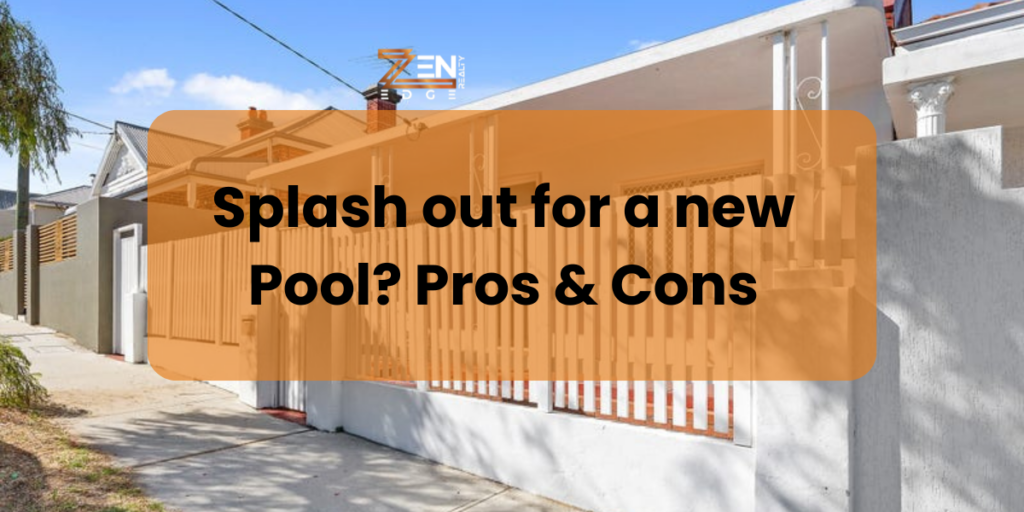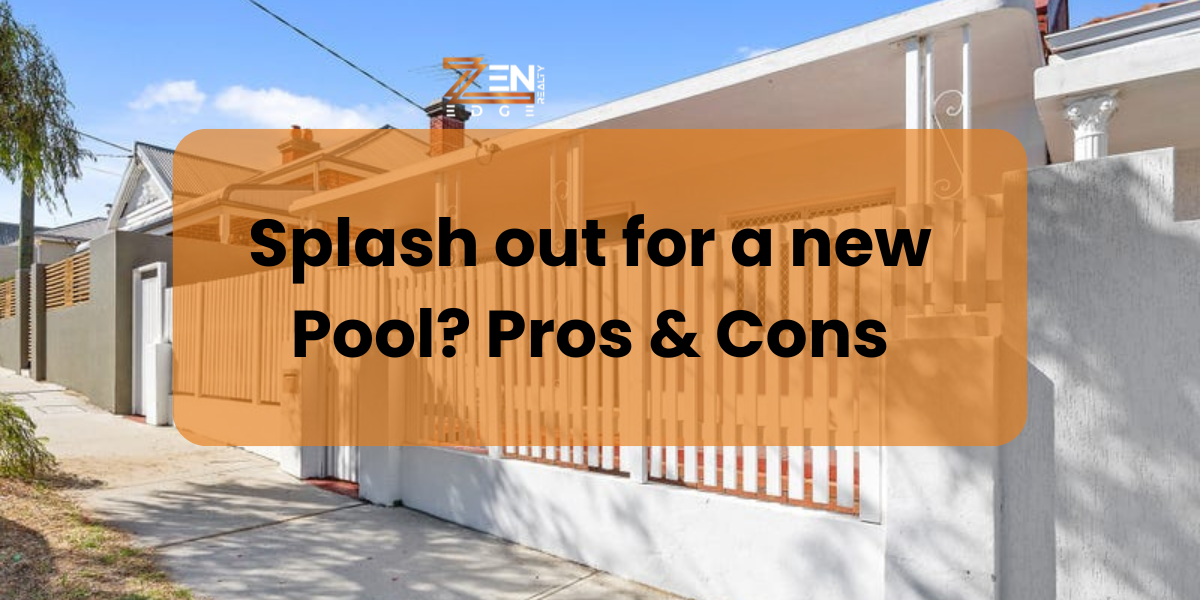
Owning a pool is a dream for many Australians, offering a perfect escape during hot summers and a great way to entertain friends and family. However, before taking the plunge and investing in a new pool, it’s crucial to weigh the pros and cons. Here, we’ll explore the benefits and drawbacks of having your own backyard oasis.
Pros of Installing a Pool
- Entertainment and Leisure
- A pool provides endless entertainment for kids and adults alike. From pool parties to quiet relaxation, it becomes a central hub for family and social gatherings.
- It’s a great way to encourage outdoor activity and can be a fun way to stay fit.
- Increase Property Value
- A well-maintained pool can significantly boost your property’s value. In regions with warmer climates, a pool can be a major selling point.
- It can make your home more attractive to potential buyers, especially families looking for added amenities.
- Health and Fitness
- Swimming is an excellent full-body workout, offering cardiovascular benefits and low-impact exercise, which is easy on the joints.
- Having a pool at home encourages regular exercise, which can lead to a healthier lifestyle.
- Aesthetic Appeal
- A beautifully designed pool can enhance the visual appeal of your backyard, transforming it into a luxurious retreat.
- With various styles and features available, you can customize your pool to match your home and landscape design.
- Convenience
- No need to pack up and head to the local pool or beach; your pool is just a few steps away.
- It’s perfect for spontaneous swims and offers privacy that public pools cannot.
Cons of Installing a Pool
- High Initial Costs
- The cost of installing a pool can be quite high, depending on the size, type, and additional features like heating, lighting, and landscaping.
- Financing a pool may require a significant upfront investment or taking out a loan.
- Ongoing Maintenance
- Pools require regular maintenance, including cleaning, chemical balancing, and equipment upkeep. This can be time-consuming and costly.
- Neglecting maintenance can lead to issues like algae growth, equipment breakdowns, and poor water quality.
- Increased Utility Bills
- Operating a pool, especially one with heating and lighting, can significantly increase your electricity and water bills.
- Heating costs can be particularly high during cooler months if you want to use the pool year-round.
- Safety Concerns
- Pools can pose safety risks, especially for young children and pets. Proper fencing, alarms, and supervision are essential to prevent accidents.
- Homeowners may also face increased insurance premiums due to the liability of having a pool.
- Limited Use
- Depending on your location, a pool might only be usable for part of the year. Even in warmer climates, unpredictable weather can limit swimming days.
- Some people find that the novelty wears off, and the pool is used less frequently than anticipated.
- Space Considerations
- Pools take up significant space in your backyard, which might limit other outdoor activities or landscaping options.
- In smaller yards, a pool can dominate the available space, leaving little room for other features like gardens or play areas.
The Financial Aspect of Pool Ownership
When considering a new pool, the financial implications are a major factor. The cost of installing a pool can vary widely depending on the type and features you choose. Concrete pools tend to be more expensive than fiberglass or vinyl-lined pools, but they offer greater customization options. Additional features like waterfalls, slides, and custom lighting can also increase costs.
Financing Options
If the upfront cost seems daunting, there are financing options available. Many pool companies offer financing plans, allowing you to spread the cost over several years. Home equity loans are another option, providing funds based on the value of your property. It’s important to consider interest rates and repayment terms to ensure they fit within your budget.
Return on Investment
While a pool can increase your property’s value, it’s crucial to consider the return on investment (ROI). In some areas, pools are highly desirable and can significantly boost home prices. However, in regions where pools are less common or climate limits their use, the ROI might not be as high. Researching your local real estate market can provide insights into the potential value a pool adds to your home.
Choosing the Right Pool Type
Selecting the right type of pool is essential. Concrete pools are durable and can be customized to any shape or size, but they require more maintenance. Fiberglass pools are easier to maintain and install, but they offer limited customization. Vinyl-lined pools are budget-friendly but may need liner replacements every 5-10 years.
Landscaping and Aesthetics
Incorporating a pool into your backyard landscape requires thoughtful planning. Beyond the pool itself, consider how it will integrate with your existing outdoor space. Adding features like decks, patios, and landscaping can enhance the overall aesthetic and functionality of your backyard, creating a cohesive and inviting environment.
Environmental Considerations
Environmental impact is another important factor. Pools consume a lot of water and energy, especially if heated. Opting for energy-efficient pumps, solar covers, and eco-friendly heating options can reduce your pool’s environmental footprint. Water-saving features like covers and efficient filtration systems can also help conserve water.
Health and Wellness Benefits
Beyond physical fitness, pools offer numerous health and wellness benefits. Hydrotherapy can be therapeutic for individuals with joint pain or arthritis, providing relief through gentle water exercises. The relaxing ambiance of a pool can also promote mental well-being, offering a peaceful retreat from daily stress.
Family Bonding and Social Connections
A pool can serve as a focal point for family bonding and social connections. It’s a space where families can spend quality time together, away from screens and indoor distractions. Hosting pool parties and gatherings can strengthen relationships with friends and neighbours, fostering a sense of community.
Safety Measures and Regulations
Safety is paramount when owning a pool. Australian regulations require pools to be fenced to prevent unsupervised access, especially by children. Installing self-closing gates, pool alarms, and non-slip surfaces can further enhance safety. Regularly educating family members and guests about pool safety practices is essential.
Weather and Seasonal Use
The usability of a pool can be limited by weather conditions. In cooler regions, pools might only be used during the summer months, making it crucial to weigh the cost against the limited use. Heated pools or adding a hot tub can extend the swimming season, but these options also come with higher operating costs.
Maintenance and Upkeep
Owning a pool involves ongoing maintenance and upkeep. Regular cleaning, balancing chemicals, and ensuring the filtration system is functioning properly are essential tasks. Many pool owners hire professional services to handle maintenance, which adds to the overall cost of ownership but ensures the pool remains in good condition.
Liability and Insurance
A pool can increase your homeowner’s insurance premiums due to the added liability. Ensuring you have adequate coverage is crucial to protect against potential accidents and damages. Some insurers may require specific safety measures to be in place to provide coverage, so it’s essential to check these requirements.
Personal Enjoyment and Lifestyle
For many, the personal enjoyment and lifestyle benefits of owning a pool outweigh the costs and maintenance. Having a private oasis to cool off, exercise, and relax in can significantly enhance your quality of life. It’s a luxury that can provide daily enjoyment and memorable experiences for years to come.
Planning and Installation Timeline
The planning and installation timeline for a pool can be extensive. From obtaining permits and approvals to the actual construction process, it can take several months. Proper planning ensures that the installation goes smoothly and meets all regulatory requirements. Working with a reputable contractor can help streamline the process.
Long-Term Commitment
A pool is a long-term commitment that requires ongoing attention and resources. It’s not just a one-time investment but a feature that will need continuous care. Understanding this commitment and being prepared for it can help you make a well-informed decision about whether a pool is right for you.
Technological Advancements in Pool Management
Advancements in pool technology have made managing and maintaining pools easier and more efficient. Automated pool cleaners, for instance, can handle routine cleaning tasks, saving you time and effort. Smart pool systems can monitor water quality and automatically adjust chemical levels, ensuring a balanced and safe swimming environment. These systems can be controlled remotely via smartphone apps, allowing you to manage your pool from anywhere. Investing in such technologies can streamline maintenance, reduce costs, and enhance the overall pool ownership experience.
Customization and Personalization
One of the most appealing aspects of installing a new pool is the ability to customize it to your liking. From unique shapes and sizes to bespoke features like infinity edges, beach entries, and integrated spas, the options are nearly limitless. You can choose from a variety of materials, colors, and finishes to match your aesthetic preferences and complement your home’s architecture. Adding personalized touches such as underwater lighting, fire features, and built-in seating can make your pool a unique and luxurious retreat. This level of customization ensures that your pool not only serves its functional purpose but also reflects your personal style.
Long-Term Savings and Efficiency
While the initial cost of installing a pool can be high, there are ways to achieve long-term savings and efficiency. Investing in energy-efficient pumps and heaters can significantly reduce your operating costs. Solar covers can help retain heat and reduce water evaporation, lowering your heating and water bills. Additionally, choosing low-maintenance materials and systems can cut down on the time and money spent on upkeep. Over time, these investments can pay off, making pool ownership more affordable and sustainable. It’s important to consider these long-term savings when planning your pool to ensure it remains a viable and enjoyable feature of your home.
Enhancing Outdoor Living Spaces
A pool can transform your backyard into an extension of your living space, providing a versatile area for relaxation, recreation, and entertainment. By integrating your pool with outdoor kitchens, lounge areas, and fire pits, you can create a comprehensive outdoor living environment. This multifunctional space can be used for everything from casual family dinners to elaborate parties and gatherings. With the right design, your pool area can become a seamless blend of functionality and aesthetics, enhancing your overall outdoor living experience. Thoughtful landscaping, such as adding shade structures and planting lush greenery, can further elevate the ambiance and usability of your outdoor space.
Considerations for Future Selling
While a pool can increase your property’s appeal, it’s essential to consider how it might impact future resale prospects. Potential buyers may see a pool as a valuable asset, particularly in warmer climates where pools are highly sought after. However, some buyers may view a pool as a liability due to maintenance and safety concerns. Understanding the preferences of your local real estate market can help you gauge how a pool will be perceived. If selling your home in the future is a consideration, investing in quality construction and maintaining your pool well can ensure it remains a positive selling point. Additionally, highlighting energy-efficient features and safety measures can address potential buyers’ concerns and make your pool a more attractive feature.
Discover the ZenEdge Realty advantage! Get an expert appraisal, confidently sell, and find your dream home with us. Get an Appraisal, Buy, or Sell with the Experts! Visit www.zenedgerealty.com.au.
Final Thoughts
Deciding to install a pool is a significant decision that impacts your finances, lifestyle, and property. By carefully considering the pros and cons, you can determine whether the benefits align with your priorities and resources. If you choose to go ahead, planning thoroughly and maintaining your pool properly will ensure it becomes a valuable and enjoyable addition to your home.

Leave a Reply